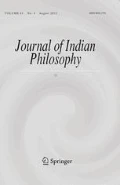Abstract
It has become commonplace in introductions to Indian philosophy to construe Plato’s discussion of forms (εἶδος/ἰδέα) and the treatment in Nyāya and Vaiśeṣika of universals (sāmānya/jāti) as addressing the same philosophical issue, albeit in somewhat different ways. While such a comparison of the similarities and differences has interest and value as an initial reconnaissance of what each says about common properties, an examination of the roles that universals play in the rest of their philosophical enquiries vitiates this commonplace. This paper draws upon the primary texts to identify the following metaphysical, epistemological, semantic and soteriological roles that universals play in the philosophy of Plato and of Nyāya and Vaiśeṣika:
Metaphysical: causal of the existence of x
Metaphysical: constitutive of the identity/essence of x
Epistemological: cognitively causal (i.e. of the cognition of one over many)
Epistemological: epistemically causal (i.e. of knowledge of x)
Semantic: necessary condition of speech and reason
Epistemological: vindicatory of induction (Nyāya only)
Metaphysical: explanatory of causation (Nyāya only)
Soteriological: cathartic contemplation (Plato only)
These roles provide us with motivations or reasons to believe that universals exist. As we examine these motivations, we find pressures mounting against our assimilating Platonic forms and the universals of Nyāya and Vaiśeṣika in the discourse about common properties. It is especially when we appreciate the utterly different contribution that universals make in securing our highest welfare that we realize how Plato and the two sister schools are not so much talking somewhat differently about the same thing, but talking somewhat similarly about different things. This better understanding of this difference in these philosophies opens a route for our better understanding of their unique contributions in the ongoing dialogue of philosophy.
Similar content being viewed by others
References
Athalye, Y.V. (eds) (2003) Tarka-Saṃgraha of Annambhaṭṭa with the author’s own Dīpikā and Govardhana’s Nyāya-Bodhinī. Bhandarkar Oriental Reseach Institute, Pune
Chakrabarti K. (1975) The Nyāya-Vaiśeṣika theory of universals. Journal of Indian Philosophy 3: 363–382
Cooper, J.M. (eds) (1997) Plato: Complete works. Indianapolis, Hackett Publishing Company
Dillon J. (1977) The middle platonists. Duckworth, London
Dravid R.R. (1972) The problem of universals in Indian philosophy. Motilal Banarsidass, Delhi
Dvivedin, V. P. (Ed.). (1984). The Praśastapāda Bhāṣya with Commentary Nyāyakandalī of Śrīdhara. Delhi: Śrī Satguru Publications. Original publication: 1895 in Benares.
Frede M. (1992). Plato’s arguments and the dialogue form. Oxford Studies in Ancient Philosophy, Supplement, 201–219.
Gautama A. (1915) The Nyāya-sūtras of Gautama. With the Bhāṣya of Vātsyāyana and the Vārttika of Uddyotakara translated into English, with notes from Vācaspati Miśra’s Nyāya-Vārttika-Tātparyatīkā and Udayana’s Parishuddhi. Belvedere Steam Printing Works, Allahabad
Gautama, A. (1982). Nyāya: Gautama’s Nyāya-sūtra with Vātsyāyana’s Commentary (M. Gangopadhyaya, Trans.). Calcutta: Indian Studies.
Gautama, A. (2003). Nyāyadarśanam with Vātsyāyana’s Bhāṣya, Uddyotkara’s Vārttika, Vācaspati Miśra’s Tātparyatīkā & Viśvanātha’s Vṛtti. New Delhi: Munshiram Manoharlal. (Original publication: 1936–1944 by Metropolitan Printing & Publishing).
Ghosh, R. (Ed.). (2003). Nyāydarśana of Gotama with Sanskrit text, Vātsyāyana Bhāṣya, Sanskrit commentary, English summary and English translation (S. C. Vidyābhūṣaṇa, Trans.). Delhi: New Bharatiya Book Corporation.
Gill C. (1996) Afterword: Dialectic and the dialogue form in late Plato. In: Gill C., McCabe M.M. (eds) Form and argument in late Plato. Clarendon Press, Oxford, pp 283–311
Gill C. (2002) Dialectic and the dialogue form. In: Annas J., Rowe C. (eds) New perspectives on Plato, modern and ancient. Harvard University Press, Cambridge, Mass, pp 145–171
Gill C. (2004) The Socratic elenchus and knowledge: Where do we go from Vlastos?. In: Karasmanis V. (eds) Socrates: 2400 years since his death. European Cultural Centre of Delphi, Athens, pp 249–265
Griswold C.L. Jr. (1988) Plato’s metaphilosophy: Why Plato wrote dialogues. In: Griswold C.L. (eds) Platonic writings, Platonic readings. Routledge, London, pp 143–167
Halbfass W. (1992) On being and what there is: Classical Vaiśeṣika and the history of Indian ontology. State University of New York, Albany
Hiriyanna, M. (2000). Outlines of Indian philosophy. Delhi: Motilal Banarsidass. (Original pub- lication: 1932).
Kaṇ āda. (1975). The Vaiśeṣika aphorisms of Kaṇāda with comments from the Upaskāra of Śankara miśra and the Vivṛtti of Jaya-Nārāyṇa Tarkapanñcānana (A. E. Gough, Trans.). New Delhi: Minishiram Manoharlal. (Original publication: 1873 by Lazarus & Co., Benares).
Krishna, D. (1991). Three conceptions of Indian philosophy. In Indian philosophy: A counter perspective (pp. 16–34). Delhi: OUP. (Original publication: Philosophy east and west, Jan. 1965).
Long A.A. (1974) Hellenistic philosophy: Stoics, epicurus, sceptics. Duckworth, London
Mādhavācārya. (2002). The Sarva-Darśana-Saṃgraha (M. M. Agrawal, Trans.). Delhi: Chaukhamba Sanskrit Pratishthan.
Matilal, B. K. (1986). Perception. Oxford: OUP.
Matilal, B. K. (2005). Epistemology, logic, and grammar in Indian philosophical analysis. Oxford: OUP. (Original publication: 1971).
McCabe M.M. (1994) Plato’s individuals. Princeton University Press, Princeton
McCabe M.M. (2000) Plato and his predecessors: The dramatisation of reason. CUP, Cambridge
Phillips S.H. (1995) Classical Indian metaphysics. Open Court, Chicago
Potter, K.H. (eds) (1977) Encyclopedia of Indian philosophies: Indian metaphysics and epistemology: The tradition of Nyāya-Vaiśeṣika up to Gaṅgeśa. Motilal Banarsidass Publishers, Delhi
Praśastapāda. (1982). Padārthadharmasam graha with the Nyāyakandalī of Śrīdhara (M. G. Jhā , Trans.). Varanasi: Chaukhambha Orientalia.
Sayre, K. M. (1992). A maieutic view of five late dialogues.Oxford Studies in Ancient Philosophy, Supplement, 221–243.
Seneca L.A. (1917) Ad Lucilium Epistolae Morales. William Heinemann, London
Shastri D.N. (1964) Critique of Indian realism: A study between the Nyāya-Vaiśeṣika and the Buddhist Dignāga school. Agra University, Agra
Sinha, B. (eds) (1999) Nyāyakusumāñjalī: Hindu rational enquiry into the existence of god. Aryan Books International, New Delhi
Stcherbatsky, F. T. (1962). Buddhist logic. New York: Dover. (Original publication: 1930).
Tigerstedt E.N. (1977) Interpreting Plato. Uppsala, Almqvist & Wiksell
Vidyābhūṣana S.C. (2002).A history of Indian logic. Delhi: Motilal Banarsidass. (Original publication: 1920 in Calcutta).
Author information
Authors and Affiliations
Corresponding author
Rights and permissions
About this article
Cite this article
Rasmussen, W. The Realism of Universals in Plato and Nyāya. J Indian Philos 37, 231–252 (2009). https://doi.org/10.1007/s10781-008-9060-x
Published:
Issue Date:
DOI: https://doi.org/10.1007/s10781-008-9060-x



